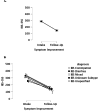First Real-World Evidence of an AI-Enhanced Digital Collaborative Care Model to Improve IBS Symptoms
- PMID: 40908534
- PMCID: PMC12534582
- DOI: 10.1111/nmo.70144
First Real-World Evidence of an AI-Enhanced Digital Collaborative Care Model to Improve IBS Symptoms
Abstract
Background and aims: Health systems struggle to deliver guideline-recommended multidisciplinary care to patients with irritable bowel syndrome (IBS). Digital collaborative care models (DCCMs) that integrate technology with experienced providers offer a promising solution for improving IBS management. We aimed to evaluate whether a novel DCCM improved clinical outcomes in IBS.
Methods: A prospective, longitudinal uncontrolled single-arm study design was used to assess the Ayble Health program. Participants were recruited online via social media, clinic, or employer. Data were prospectively collected from 202 participants (78% female; 78% white) with active IBS symptoms at baseline (≥ 75 on the IBS symptom severity scale (IBS-SSS)) and completed at least one follow-up symptom survey. All participants engaged in at least one care pathway: (1) a multidisciplinary care team, (2) a nutrition program with a personalized elimination diet, and (3) a brain-gut behavioral therapy (BGBT) program. Each pathway was supported by AI algorithms trained on a large, multimodal GI dataset to identify and communicate key trends in patient-reported outcomes, further personalizing care plans.
Results: Of the 202 participants, 197 (98%) participated in the nutrition pathway, 152 (75%) the BGBT pathway, and 156 (77%) the care team pathway. The majority of participants (62%) enrolled in all three pathways. Participants experienced a 140-point decrease in IBS-SSS, on average, with 86% experiencing a ≥ 50-point reduction.
Conclusion: The novel DCCM successfully delivered evidence-based care to participants with active IBS symptoms, with clinically significant, sustained symptom relief. Randomized clinical trials are recommended to assess cost and treatment efficacy compared to standard of care approaches.
Keywords: brain–gut behavioral therapy; collaborative care model; dietary treatment; irritable bowel syndrome.
© 2025 The Author(s). Neurogastroenterology & Motility published by John Wiley & Sons Ltd.
Conflict of interest statement
Stephen E. Lupe: Scientific Advisor, Boomerang Health; Paid Lecturer, Takeda Pharmaceuticals; Scientific Advisor; Healthnix. Joseph M. Olson: employee at Ayble Health Inc. with stock options. Mythili P. Pathipati: consultant at Ayble Health Inc. Samuel N. Jactel: officer at Ayble Health Inc. with stock options. Tiffany H. Taft: Scientific Advisor, Ayble Heath Inc.; ownership interest, Oak Park Behavioral Medicine LLC. Anthony Lembo: GSK, Takeda, Ardelyx, Vibrant, Atmo, BioAmerica, Ironwood, J&J, Bristol Myer Squibb, Allurion. Miguel Regueiro: Advisory Boards and Consultant (both) for Abbvie, Johnson and Johnson, UCB, Takeda, Pfizer, BMS, Organon, Amgen, Genentech, Gilead, Salix, Prometheus, Lilly, Celgene, Boehringer Ingelheim Pharmaceuticals Inc. (BIPI), Celltrion, Roche, Merck, Sanofi, Biocon, Abavax.
The authors declare no conflicts of interest.
Figures




References
-
- Sperber A. D., Dumitrascu D., Fukudo S., et al., “The Global Prevalence of IBS in Adults Remains Elusive due to the Heterogeneity of Studies: A Rome Foundation Working Team Literature Review,” Gut 66, no. 6 (2017): 1075–1082. - PubMed
-
- Black C. J. and Ford A. C., “Global Burden of Irritable Bowel Syndrome: Trends, Predictions and Risk Factors,” Nature Reviews. Gastroenterology & Hepatology 17, no. 8 (2020): 473–486. - PubMed
-
- Black C. J., Thakur E. R., Houghton L. A., Quigley E. M. M., Moayyedi P., and Ford A. C., “Efficacy of Psychological Therapies for Irritable Bowel Syndrome: Systematic Review and Network Meta‐Analysis,” Gut 69, no. 8 (2020): 1441–1451. - PubMed
-
- Lacy B. E., Pimentel M., Brenner D. M., et al., “ACG Clinical Guideline: Management of Irritable Bowel Syndrome,” American Journal of Gastroenterology 116, no. 1 (2021): 17–44. - PubMed
MeSH terms
LinkOut - more resources
Full Text Sources

